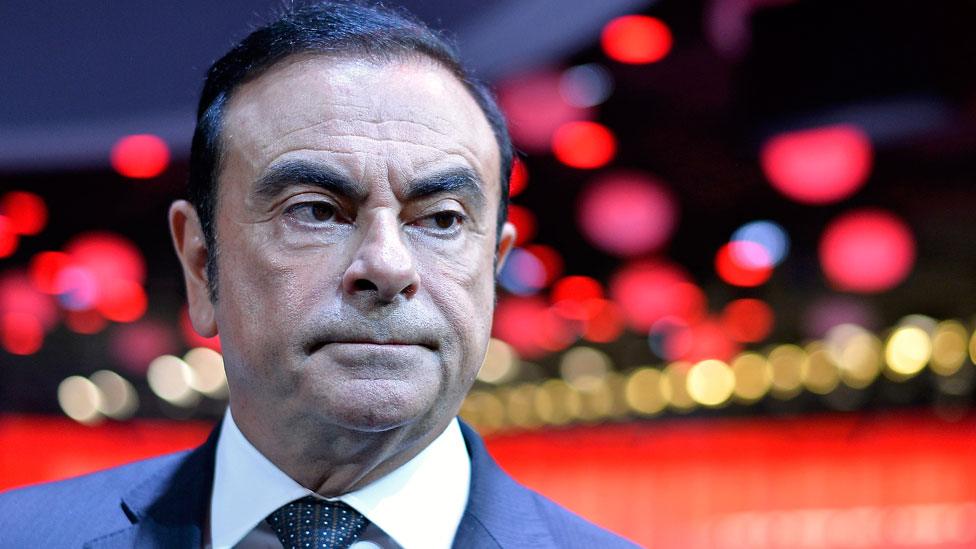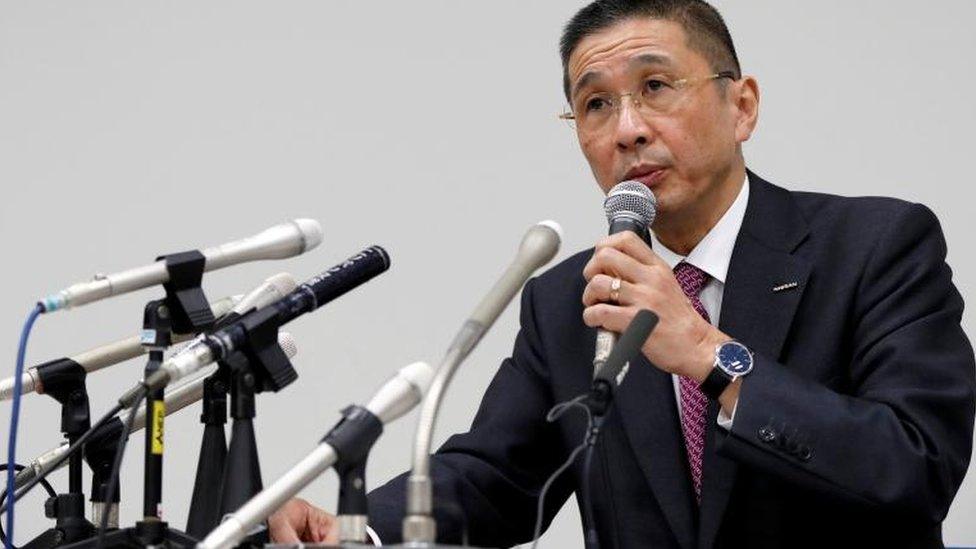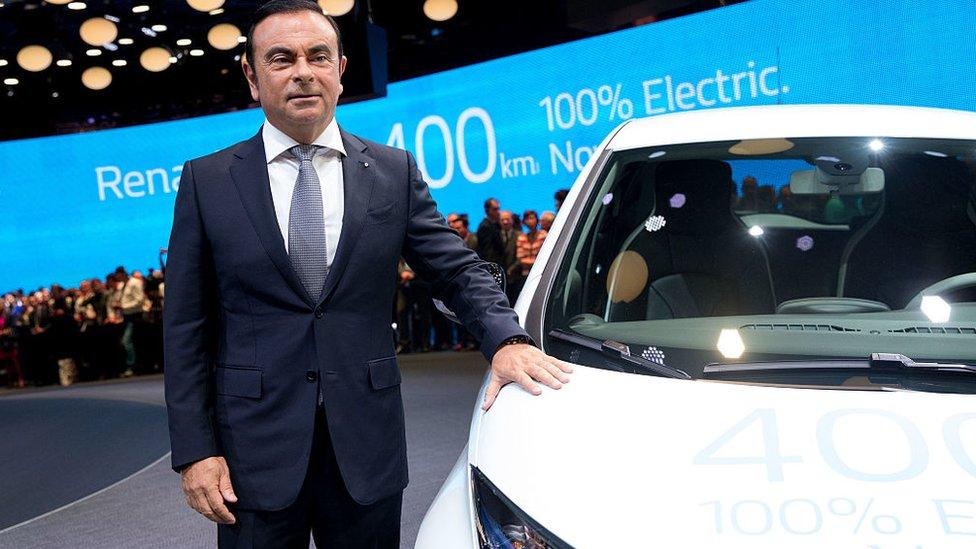Nissan boss Carlos Ghosn arrested over 'misconduct'
- Published

Carlos Ghosn is head of the Alliance, which includes Nissan, Renault and Mitsubishi
Nissan chairman Carlos Ghosn has been arrested over claims of financial misconduct, the carmaker has said.
Mr Ghosn, a towering figure in the car industry, will be sacked from the Japanese firm after a board meeting on Thursday, its chief executive said.
He has been accused of "significant acts of misconduct", including under-reporting his pay package and personal use of company assets.
Nissan said it was unable to give further details on the offences.
Japanese prosecutors have yet to comment on Mr Ghosn's arrest.
Nissan is the world's sixth-largest carmaker and its site in Sunderland is the UK's biggest car plant.
"I feel despair, indignation and resentment." said Nissan chief executive Hiroto Saikawa at a news conference. "As the details are disclosed I believe that people will feel the same way as I feel today."

Nissan's Hiroto Saikawa said he believed the misconduct "went on for a long period"
Mr Saikawa said Nissan would now try to "stabilise the situation, and normalise day-to-day operations" for staff and business partners.
It said, external it had been conducting an internal investigation for several months, prompted by a whistleblower.
According to Japanese media reports, which have not been confirmed, he under-reported an amount totalling 5bn yen (£34m) over a five-year period from 2011.
Mr Ghosn was paid 735m yen (£5.1m) by Nissan in the most recent financial year, 227m yen (£1.6m) by Mitsubishi and €7.4m (£6.6m) by Renault - a total of about £13.3m.
Mr Saikawa said he believed the misconduct "went on for a long period".
From 2010, Japanese firms have been required to disclose the salaries of executives who earn more than 100m yen.
The carmaker added that it had been providing information to the Japanese Public Prosecutors Office and would continue to do so.
Nissan said it also planned to oust senior executive Greg Kelly, who had been "deeply involved" in the misconduct.
Mr Kelly - who has also been arrested, according to the firm - was described as a close aide to Mr Ghosn. Mr Saikawa said he was able to "exert influence" in the company.
As well as being chairman of Nissan, Mr Ghosn is also chairman and chief executive of Renault and chairman of Mitsubishi Motors.
Mitsubishi said it would propose the removal of Mr Ghosn as chairman.
It said: "In response to the arrest of Ghosn, and since the alleged misconduct is related to a corporate governance and compliance issue, it is to be proposed to the board of directors to promptly remove Ghosn."
In addition, he is chairman and chief executive of the Renault-Nissan-Mitsubishi Motors strategic alliance. Shares in Renault fell sharply after the news, dropping almost 10%.
Renault said its board would meet "very shortly".
Philippe Lagayette, a board member at the car giant, said the company was awaiting "precise information" from Ghosn and expressed its "dedication to the defence of Renault's interest" in its alliance with Nissan and Mitsubishi.
Mr Saikawa said that Mr Ghosn had been given too much power making proper oversight difficult.
"The problem of governance was significant. Looking back, after 2005 when he became CEO [chief executive] of both Renault and Nissan, we did not really discuss the implications," he said.


Who is Carlos Ghosn?
His hero status was so big that his life was serialised in one of Japan's famous cartoon comic books
The Brazilian-born boss of Lebanese descent and a French citizen says his background left him with a feeling of being different, which helped him adapt to new cultures
In France he was known as Le Cost Killer, a comment on the deep cuts he made to revive Renault
He was once tipped as a potential president of Lebanon, a move he eventually dismissed because he already had "too many jobs"
In a 2011 poll of people the Japanese would like to run their country Mr Ghosn came seventh, in front of Barack Obama (ninth)

'Extremely vigilant'
The French state owns 15% of Renault, which in turn holds a 43.4% stake in Nissan. French President Emmanuel Macron said the country would work to preserve the stability of Renault and its alliance with Nissan.
"As a shareholder... however, the French government will remain extremely vigilant regarding the stability of the alliance, the (Renault) group and... its employees, who have the full support of the state."
Mr Ghosn has been a titan of the motor industry for nearly 20 years. He was responsible for a dramatic turnaround at Nissan in the early 2000s when the car firm was on the verge of bankruptcy.
Dubbed the "cost-killer" in the 1990s for slashing jobs and closing factories, his reputation was cemented after his strategy succeeded.
Mr Ghosn began his career at Michelin in France, moving on to Renault. He joined Nissan in 1999 after Renault bought a controlling stake and became its chief executive in 2001. Mr Ghosn remained in that post until last year.
The scandal comes just months after Mr Ghosn's €7.4m pay package from Renault for last year was narrowly approved by shareholders.

Analysis
By Theo Leggett, business correspondent
Carlos Ghosn is a towering figure in the motor industry. He has been credited with turning around both Renault and Nissan, before going on to become the linchpin of the Renault-Nissan Alliance.
That Franco-Japanese axis, which also now includes Mitsubishi, is one of the world's biggest carmakers.
The question is what happens now. Mr Ghosn had already begun shedding some of his responsibilities - he stepped down as chief executive of Nissan last year, and recently offloaded some day to day responsibilities at Renault as well.
But he was expected to remain chief executive of Renault and to continue in overall charge of the Alliance for the next few years.
Today's announcements seem to undermine that strategy. It's not clear what Renault will now do.
But plans for an orderly succession - and potentially the entire future of the rather unwieldy Renault-Nissan-Mitsubishi structure - may well have been thrown wide open.

- Published1 July 2018
